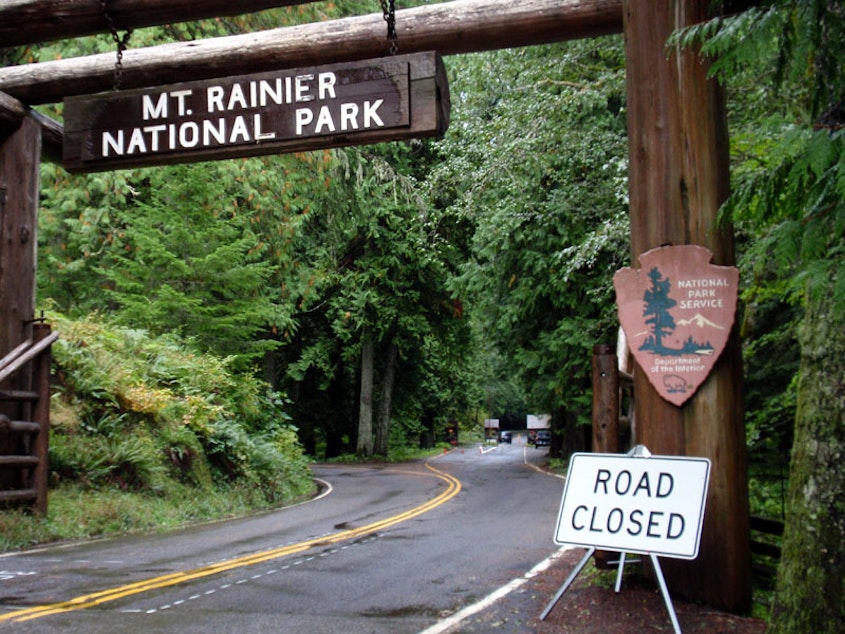Local impacts from a partial government shutdown shouldn't be too bad — for now

If Congress and the Trump administration cannot broker a deal to fund the government, which looks increasingly possible late Friday, there's a solace for the Pacific Northwest: Based on check-ins with federal agencies here, the local effects of a partial federal government shutdown would likely be limited.
Compared to prior government shutdowns, this one affects fewer agencies. Regional offices of federal agencies had scant details as of Friday afternoon about the timing and impacts of a partial shutdown. They were waiting for direction from their headquarters, which in turn were waiting to see if Congress and Trump administration strike an 11th-hour deal to resolve an impasse over funding of the president's proposed wall along the U.S.-Mexico border.
National parks, however, would be affected. The contingency plan for the National Park Service says to stop plowing roads. Given the current wintry weather, that would close Crater Lake and Mount Rainier National Parks in short order. Fort Clatsop would be likely to close too.
"As a general rule, if a facility or area is locked or secured during non-business hours (buildings, gated parking lots, etc.) it should be locked or secured for the duration of the shutdown," read the guidance published by the National Park Service headquarters office.
The National Park Service and U.S. Forest Service contingency plans say public roads, lookouts and trails can remain open to visitors as long as they're safe with no rangers around.
"Access to Forest Service land is still going to be there," said Mt. Baker-Snoqualmie National Forest spokesperson Colton Whitworth by phone on Friday. "It'll just be offices, visitor centers and ranger stations that will be closed."
The National Wildlife Refuge System plans to follow the same policies.
Livestock grazing and timber harvests that don't require daily oversight can continue, according to the Forest Service shutdown policy. Washington state and Oregon Sno-Parks, which are frequently on federal land, will continue to be plowed and stay open under state contracts paid for through user fees.
Local offices of the Internal Revenue Service and USDA Farm Service Agency would also be shuttered. But with a holiday week ahead, the number of canceled appointments is bound to be small.
The nine federal agencies that stand to see their continuing funding cut off are the Treasury, Agriculture, Homeland Security, Interior, State, Housing and Urban Development, Transportation, Commerce and Justice departments.
Commerce's shutdown contingency plan directs NOAA research vessels to return to port or stay in port. The two large NOAA fishery survey and oceanographic vessels homeported in the Northwest were already moored at their pier in Newport, Oregon on Friday.
Federal workers who provide services deemed "essential" such as law enforcement, customs and border patrol, weather forecasting, air traffic control and airport checkpoint screening will stay on the job, although their paychecks may be delayed.
The U.S. Postal Service won't be affected because it is an independent agency, so you can expect last-minute packages and holiday cards to be delivered.
Federal courts and the Supreme Court will continue to operate using fees and other fund balances in the short term. A spokesperson for the Administrative Office of the U.S. Courts said the federal judiciary could remain open for about three weeks with existing funds.
U.S. Environmental Protection Agency acting administrator Andrew Wheeler notified staff late Thursday that his agency has enough money in reserve to stay open through December 28, as reported by the Washington Post.
Earlier in the fall, Congress managed to pass 2019 budgets for the Defense, Energy, Health and Human Services, Education, Veterans Affairs and Labor departments. Social Security will still be paid out as will Medicare reimbursements and food stamps.
In a statement, House Appropriations Committee Chairman Rodney Frelinghuysen noted that this year's Congress "enacted the majority of all discretionary spending for the year – 75 [percent] – prior to the end of the fiscal year, an accomplishment that hasn’t occurred in over two decades." [Copyright 2018 Northwest News Network]

